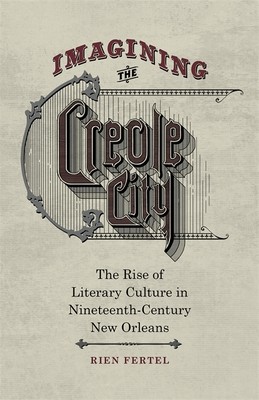
- We will send in 10–14 business days.
- Author: Rien Fertel
- Publisher: LSU Press
- ISBN-10: 0807158232
- ISBN-13: 9780807158234
- Format: 13.8 x 22.5 x 2.3 cm, hardcover
- Language: English
- SAVE -10% with code: EXTRA
Reviews
Description
In the early years of the nineteenth century, the burgeoning cultural pride of white Creoles in New Orleans intersected with America's golden age of print, to explosive effect. Imagining the Creole City reveals the profusion of literary output --histories and novels, poetry and plays--that white Creoles used to imagine themselves as a unified community of writers and readers.
Rien Fertel argues that Charles Gayarré's English-language histories of Louisiana, which emphasized the state's dual connection to America and to France, provided the foundation of a white Creole print culture predicated on Louisiana's exceptionalism. The writings of authors like Grace King, Adrien Rouquette, and Alfred Mercier consciously fostered an image of Louisiana as a particular social space, and of themselves as the true inheritors of its history and culture. In turn, the forging of this white Creole identity created a close-knit community of cosmopolitan Creole elites, who reviewed each other's books, attended the same salons, crusaded against the popular fiction of George Washington Cable, and worked together to preserve the French language in local and state governmental institutions. Together they reimagined the definition of "Creole" and used it as a marker of status and power. By the end of this group's era of cultural prominence, Creole exceptionalism had become a cornerstone in the myth of Louisiana in general and of New Orleans in particular. In defining themselves, the authors in the white Creole print community also fashioned a literary identity that resonates even today.EXTRA 10 % discount with code: EXTRA
The promotion ends in 19d.01:15:29
The discount code is valid when purchasing from 10 €. Discounts do not stack.
- Author: Rien Fertel
- Publisher: LSU Press
- ISBN-10: 0807158232
- ISBN-13: 9780807158234
- Format: 13.8 x 22.5 x 2.3 cm, hardcover
- Language: English English
In the early years of the nineteenth century, the burgeoning cultural pride of white Creoles in New Orleans intersected with America's golden age of print, to explosive effect. Imagining the Creole City reveals the profusion of literary output --histories and novels, poetry and plays--that white Creoles used to imagine themselves as a unified community of writers and readers.
Rien Fertel argues that Charles Gayarré's English-language histories of Louisiana, which emphasized the state's dual connection to America and to France, provided the foundation of a white Creole print culture predicated on Louisiana's exceptionalism. The writings of authors like Grace King, Adrien Rouquette, and Alfred Mercier consciously fostered an image of Louisiana as a particular social space, and of themselves as the true inheritors of its history and culture. In turn, the forging of this white Creole identity created a close-knit community of cosmopolitan Creole elites, who reviewed each other's books, attended the same salons, crusaded against the popular fiction of George Washington Cable, and worked together to preserve the French language in local and state governmental institutions. Together they reimagined the definition of "Creole" and used it as a marker of status and power. By the end of this group's era of cultural prominence, Creole exceptionalism had become a cornerstone in the myth of Louisiana in general and of New Orleans in particular. In defining themselves, the authors in the white Creole print community also fashioned a literary identity that resonates even today.

Reviews